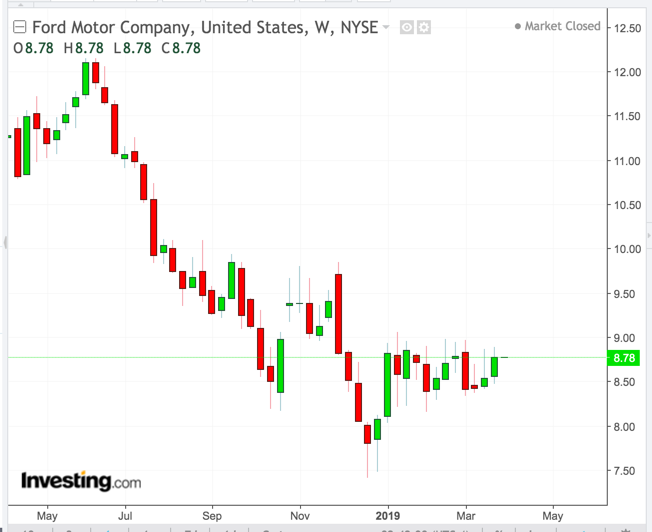One of America’s most trusted brands — Ford Motor Company (NYSE:F) — has been on a downward slide for several years. Shares of the second biggest automaker have consistently produced negative returns over the past five years, missing out on the strong rally in equity markets that sent shares of many consumer stocks soaring.
The stock was trading at $8.78 per share at Friday's close, down almost 21% from $10.86 a year ago. However, one result of this extended bearish spell, and something that stands out about Ford, is its highly attractive dividend yield, which is now close to 7%. To put this into context, compare it with the S&P 500’s average yield of 1.93%. 
Is the dividend safe though? Generally, when a company offers a return higher than the market average, it’s taken as a sign of danger. Investors seek a discount to own a stock which is considered more risky. So, does investing in Ford's shares make sense for investors seeking stable dividend income?
Major Turnaround in Progress
It’s been a tough road for Ford. After many years of rising sales, helped by the robust global economy and consumer demand, the car-maker is now facing powerful headwinds: it's undertaking an $11 billion restructuring, after its net income fell by more than half last year as demand for its sedan cars slowed. The turnaround will involve canning thousands of salaried jobs, closing factories overseas, and building capacities to manufacture electric and driverless cars.
The company is exiting from smaller car markets and focusing on SUVs and trucks in the U.S., while accelerating its efforts to quickly enter the electric and self-driving vehicle markets. Last month, it announced it will spend $900 million to build electric and driverless cars at its Flat Rock plant south of Detroit.
As Ford undertakes this massive restructuring exercise to improve profitability and get ready for this new era, investors haven’t shown much faith. The stock has traded below $10 a share since the past summer amid concerns about the sustainability of its generous $0.15-a-share quarterly dividend.
Analysts have built in a potential scenario where Ford's credit-rating could be downgraded soon, and its dividends slashed, if the company’s turnaround plan fails to produce results. The automaker’s reluctance to offer guidance for 2019 is further fueling these fears.
“There is certainly significant value buried in Ford shares, though we are in no rush to buy them with market uncertainty still high (evidenced by management’s reluctance to provide specific guidance) and heavy lifting still required to remove barriers to better performance,” Bank of Montreal analyst, Richard Carlson, said after the company’s Q1 earnings report at the end of last month.
“We remain cautious on the shares, as we believe new money going into auto today should be steered towards companies that already have earnings momentum.”
Despite Ford’s serious attempt to fight the changing consumer trends and the technology, it’s becoming tough to get excited about its high dividend yield. We believe the company's strategy to fund its transformation into a modern automaker through selling SUVs and big trucks is a risky one.
Consumers will quickly shun these high-priced vehicles if the economy turns sour, or the gas prices at the pump continue to soar. A similar combination forced Ford to eliminate its dividend in 2006, which it resumed in 2012 after it emerged as the only Detroit automaker to make it through the global recession without resorting to a government-backed bankruptcy.
Another reason that makes traditional car-makers a less attractive investment option, in our view, is a growing consumer trend where ride-sharing is becoming a new norm, which eliminates much of the need to own a car.
The market valued Lyft Inc. (NASDAQ:LYFT), the second-largest ride-hailing service in the U.S., not far behind Ford in last week’s IPO. Investors' enthusiasm about Lyft, which doesn’t own massive car manufacturing plants, is a big indicator where the future lies.
Bottom Line
It’s hard to see growth returning to Ford anytime soon. The auto industry is going through major changes which will continue to put pressure on Ford’s earnings, free cash flows and its share price. For long-term income investors, it’s better to wait on the sidelines and monitor how its turnaround is shaping up.
